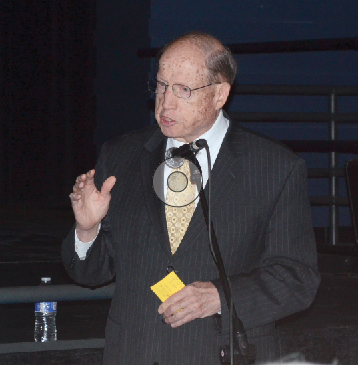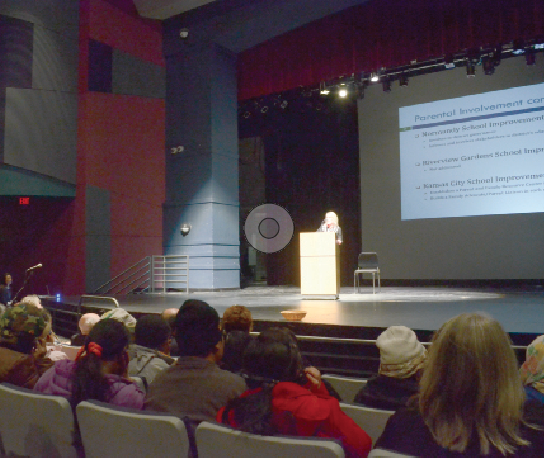By LESLIE COLLINS
Northeast News
February 5, 2014
Area residents packed Paseo Academy auditorium Jan. 29, ready to learn more about the proposed state intervention plans for unaccredited school districts and to share their impassioned pleas for education.
Officials with the Missouri Department of Elementary and Secondary Education (DESE) provided a brief overview of each of the six plans, highlighting key points like governance, finance, education quality and accountability.
DESE Deputy Commissioner for Learning Services Margie Vandeven said more than 62,000 students are enrolled in provisionally accredited and unaccredited school districts in Missouri. In unaccredited districts, less than 30 percent of students achieved proficiency in the four content areas on state tests, she said.
“The impending bankruptcy of unaccredited districts makes the development of a plan imperative,” she said.
Missouri Commissioner of Education Chris Nicastro told Northeast News that DESE officials will use community feedback to shape their recommendations to the state school board later this month.
“What is the appropriate role for the state in supporting, and if necessary, intervening in unaccredited school districts? That’s where we really need your assistance,” Vandeven told the crowd.
Due to time constraints, only 16 attendees were allowed to testify and most supported the Kansas City Public Schools.
“It’s unfortunate we’re at this place because in my heart I really believe this district has earned accreditation,” said KCPS parent Patrick Bustos.
Bustos paused as the crowd applauded.
“It’s unfortunate that we have not been given what we’ve earned,” he continued. “But I also think we have some work to do and I believe the school district and the administration of Kansas City Public Schools have come up with a good starting point. If the state board is really interested, what they really need to do is get on board with us.”
Andrea Flinders, president of the Kansas City Federation of Teachers, urged state education officials to ask themselves two questions when considering choosing a plan: 1. Is it really meeting the needs of our children and 2. How do you know?
Flinders said the district is not failing, but faces additional challenges; ninety percent of the students live in poverty, she said, adding that 24 percent of KCPS students are English Language Learners. Students also deal with homelessness, hunger, parents who are focused on survival, not education, she said. Teachers and administration face “tremendous pressure to help our children, but they need the programs and services to help them,” she said.
Anne Pritchett, who’s taught in the school district for 29 years, agreed that wrap around services are vital. Pritchett taught at McCoy Elementary School until it closed and said the school perfected its spread of wrap around services for students in need and achieved numerous successes despite having a high free and reduced lunch rate and a number of ELL students, she said. McCoy achieved Adequate Yearly Progress (AYP) for years and earned Gold Star recognition from Missouri in 2001, she said.
Kansas City City Council member John Sharp said when state officials question why KCPS hasn’t been more successful, they should look in the mirror for the answer.
“Missouri has never fully funded public education as it should,” Sharp said as attendees applauded. “And the funding for public education is not distributed fairly because the formula does not adequately recognize the higher cost of education in urban areas.”
In addition to inadequate funding, the district has also faced instability over the years, he said.
“There’s been a revolving door of superintendents, there’s been a revolving door on the school board,” Sharp said. “Now when we have stability, the biggest threat to our stability is the state. It should get provisional accreditation and the state should not keep moving the goal posts!”
Two attendees testified that KCPS can’t continue with the status quo.
“I am terribly disappointed in everyone that stands here in defense of the district,” said KCPS parent Melissa Eddy, who pointed out the district’s low ACT scores. “It is criminal the level of education our children have been getting; it’s got to stop. Why are we defending the status quo? I am baffled. Why are they so afraid of losing local control that they will put the children at risk? Please adopt a plan that proposes a real solution.”
Nicastro told Northeast News she appreciated the community’s passion and how they care about their community and schools. As for the attendees’ suggestions regarding providing quality wrap around services to students, Nicastro said she agreed.
“We have to make sure there are no barriers to learning,” she said.
Nicastro said the department has “a lot of homework to do” and will be working closely with state legislators.
KCPS Board of Education President Airick West told Northeast News he’s not pushing for a particular plan and added, “When discussing scholar achievement, the best solution for our scholars is often not on the far reaches of one direction or the other, but somewhere in the middle. I think there’s a great deal to be learned and great ideas to be implemented from each of the plans. The responsibility is on us to engage our community in a meaningful dialogue that pools the best of these plans and finds a way forward collectively.”
West said that while KCPS scholars are on an improving trajectory, “this is not the destination we seek; our aspirations for our scholars are still a long and difficult journey, but I think what I heard people say this evening is when we come together as Kansas Citians, united for the achievement of our scholars, we do have the tools in this community to make public education great again.”



















